Stone for Development Work-Integrated Learning Program (now Mineral Security Masterclass)
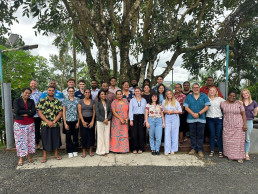
Photo credit: Fiji Mineral Resource Department
In July 2024, geoscientists from Fiji, Kiribati, Solomon Islands, Tonga, Tuvalu, and Australia participated in the Stone for Development Work Integrated Learning Program.
This program, led by the University of Queensland (UQ) and Fiji’s Mineral Resources Department (MRD), trains early-career geoscientists in sustainable development challenges related to Pacific Development Minerals, while also building practical geoscience knowledge and skills.
The SFD program includes 40 hours of online training, followed by a two-week in-person placement in Fiji for scholarship recipients. For 2024, there were 36 registered online participants whereby 18 students (funded by DFATs new Colombo Plan) participated on work placements in Fiji and engaged in projects such as geological hazard mapping and assessment, environmental monitoring of river gravel extraction, river gravel resource assessment, and exploring the role of stone in Fiji’s architectural and cultural heritage.
UNDP, EU, and SPC Collaborate to Enhance Fiji's Development Minerals Sector
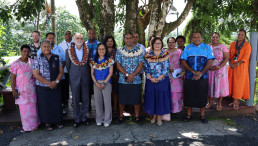
Photo credits: UNDP
Suva, Fiji: A significant milestone in the advancement of Fiji’s Development Minerals sector has occurred as the United Nations Development Programme (UNDP) Pacific Office in Fiji – in collaboration with the European Union in the Pacific (EU) and the Pacific Community (SPC) – officially handed over a state-of-the-art scanner and associated software to Fiji’s Ministry of Lands and Mineral Resources Development.
This support will contribute to the enhancement of geodata management across Fiji.
While officiating a handover ceremony held in Suva last week, Minister for Lands and Mineral Resources, Hon. Filimoni Vosarogo, expressed his gratitude for the collaborative efforts.
“This momentous occasion serves as a pivotal platform for global collaboration and the significant importance of digitization and digitalization.
“This partnership with SPC in assisting with the Development Minerals Program in Fiji, with funding from the African Caribbean Pacific Group of States and the European Union (ACP-EU), was initially rolled out in 2015 with UNDP coordinating the program. It underscores our collective commitment and the Fiji Government’s priority in using our mineral resources to enhance development in Fiji,” he said.
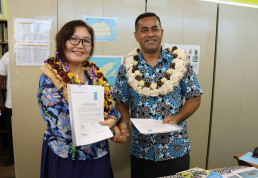
Photo credits: UNDP
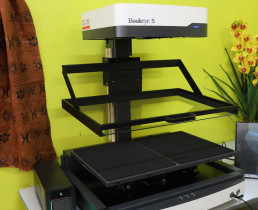
Photo credits: UNDP
Maurizio Cian, Head of Cooperation with the Delegation of the European Union for the Pacific, reiterated the EU’s commitment to supporting Fiji and other Pacific Island countries in the promotion of sustainable exploration of raw materials on land.
He added that the EU was proud to support Fiji’s efforts in enhancing geodata management and promoting sustainable sourcing of Development Minerals.
“We are proud to support the mineral resources department of the ministry to improve the development of mineral geodata management, and to develop a digital library of geodata that is successfully transferred to the government server,” he said.
Ngedikes Olai Uludong, Deputy-Director for the Geoscience, Energy and Maritime Division with SPC, emphasized the importance of partnerships in achieving the sustainable development goals.
“These kinds of initiatives address SDG Goal 17, which is about partnerships. We cannot do it alone, and for small steps, such as this equipment, it makes a difference in the grand scheme of things,” she said.
Resident Representative for the UNDP Pacific Office in Fiji, Munkhtuya Altangerel, reiterated the organization’s commitment to supporting the Government of Fiji to further harness the potential of mineral resources for sustainable development, economic growth, and social prosperity.
“Through UNDP’s continuous efforts to promote technical and investment cooperation, we remain steadfast in advocating for change, capacity building, and connecting Fiji to resources and knowledge in the development minerals sector.
“Ultimately, our goal is to support the Government of Fiji in managing these valuable resources more effectively, addressing environmental and social impacts, and creating jobs and livelihoods for both women and men,” Ms. Altangerel said.
The handover took place on Friday, April 12.
This story was originally published by UNDP Pacific Office on April 16, 2024
Launch of the Digital Geodata Library
Suva, Fiji
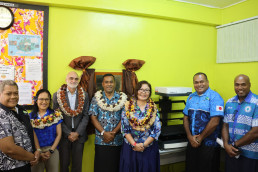
Photo credit: UNDP Pacific Office
In partnership with the European Union (EU) in the Pacific and the Pacific Community (SPC) the Programme supported the Mineral Resources Department (MRD) of Fiji to develop and launch its Geodata Digital Library to digitize geological data in Fiji. The Programme further supported the MRD through donation of a high-end scanner to digitize publications which can now be uploaded and accessed through the Geodata Digital Library. This will significantly improve geodata management across the country and will allow external researchers and developers within Fiji to access relevant publications, promoting greater collaboration and knowledge sharing.
Currently, access to the geodata library is limited to users within Fiji.
Recognising Development Minerals For Resilient Development
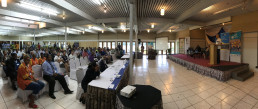
Photo credits: UNDP/Jone Raqauqau
Suva, Fiji – A recent two-day trade fair has shed light on the Development Minerals industry in Fiji and the importance of a better informed and sustainable practice choices for all stakeholders involved.
The event provided a platform for relevant government departments, commercial operators, environment organisations, civil society organisations, financing institutions and resource owners to network. Financing institutions have been widely involved as access to finance is often a challenge for start-up businesses.
The Trade Fair for Development Minerals is an activity under the ACP-EU Development Minerals Programme which is an initiative by the African, Caribbean, and Pacific (ACP) Group of States, coordinated by the ACP Secretariat, financed by the European Union (EU) and United Nations Development Programme (UNDP), and implemented by UNDP. The project is implemented in partnership with the Mineral Resources Department.
Development Minerals’ are materials that are mined, processed, manufactured and used domestically in industries such as in construction, manufacturing, and agriculture. Development Minerals are economically important for the areas surrounding the location where it is mined.
In delivering his opening address, the Permanent Secretary for Lands and Mineral Resources, Malakai Finau highlighted the importance of partnership.
“There is a huge responsibility on all stakeholders, from resource owners, private sector, regulatory agencies and development partners to pool resources together and collaborate more effectively in working towards the common goal of achieving environmental, social and economic balance in the utilisation of Fiji’s vast and diverse mineral resources,” said Finau.
He added, “With the growth of Fiji’s economy over the years, the demand for gravel and sand has escalated with more applications received by the Ministry for rivers and streams gravel/sand extraction licenses on a commercial basis to keep pace with the national infrastructure developments.”
“Taking into consideration the importance of our minerals, the Department recently opened a new Core Repository, which will assist the Government establish a national mineral resource inventory to provide valuable geoscience information to the relevant stakeholders, current and future sector investors, as well as education institutions,” said Finau.
For Fiji, although Development Minerals come under the Quarry Act, itis often confused with High Value Mining that extract metals such as gold, copper, silver etc. ‘’High Value’’ involves different processes and falls under the Mining Act.
In her opening address, the Acting Head of Cooperation of the European Union Delegation for the Pacific, Emmanuelle Guiheneuf, highlighted the importance of the development minerals sector.
“The mining of development minerals has important implications for sustainable development, however, they have not to date received adequate attention for their potential to impact livelihoods and few development programs have provided support for this mining sub-sector,” said Guiheneuf.
She added, “The ACP-EU Development Minerals Project has certainly achieved a lot in the last three years and this includes; the 21 unit curricula with the Fiji National University (FNU) in Mining and Quarrying, established a development minerals working committee with the Minerals Resources Department and stakeholders in the industry, the creation and support for a development minerals working group in the Fiji Parliament, as well as small grants given to resource owners for their start up business.”
In his address, the Country Director, UNDP Pacific Office in Fiji and Head of Pacific Regional Programmes and Policy, Bakhodir Burkhanov, highlighted how development minerals are intrinsic to local and global economies.
“This Trade Fair is therefore a culmination of three years of hard work with many partners to deepen the understanding of Development Minerals among all stakeholders and to help them make better informed and more sustainable choices in the future,” said Burkhanov.
He added, “Development Minerals are all around us, but we often don’t notice them. This is why they are also called Neglected Minerals or Low-Value Minerals. They are too often overlooked but play a pivotal role in our economies. In Fiji, it is estimated that they contribute up to 3.7% of the GDP.”
“Significant scope exists to establish several new Development Mineral industries in Fiji, including; cement produced from local resources, industrial lime, ceramics utilising residual clays, clay bricks, glass production from silica sand resources, industrial salt production, and phosphates.”
“They are the pillar of the construction industry as we need more and higher quality materials to build resilient infrastructure that can withstand the impacts of disasters and climate change, particularly here, in the highly vulnerable Pacific islands,” said Burkhanov.
The Trade Fair for Development Minerals with the theme ‘Building a Rock-Solid Future for Fiji’ was held in Lami, on the 30 and 31 of October.
This story was originally published by UNDP Pacific Office on November 25, 2018
https://www.undp.org/pacific/news/recognising-development-minerals-resilient-development
